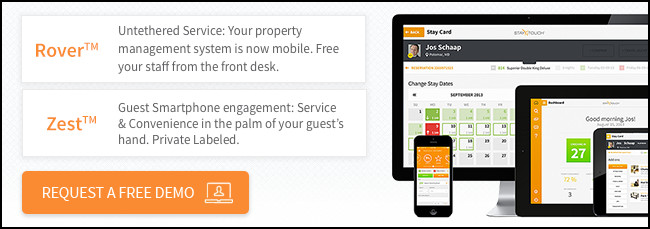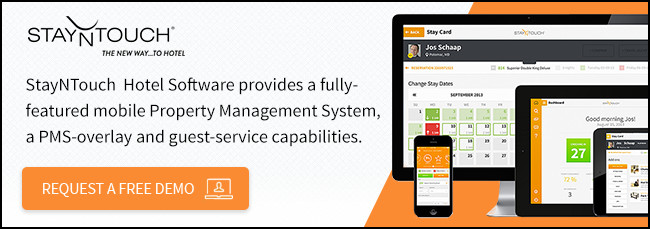Hospitality management systems or property management systems come with several advantages that help hotels up their services and provide the best experience to the guest. Newer cloud based systems have the ability to provide deeper levels of business intelligence to owners that help to maximize operational efficiency, deliver a greater personalized service and increase revenue. But with so many different hospitality management systems on offer in the market, how do you know which one is right for you? Here are 3 essential features that you should look for when out shopping for your new hospitality management system.
Mobility: Mobility is key. Consumers spend more time on their mobile phones than ever before. It has become a major touch point for customers. Travellers and guests have a growing preference to engage in business transactions using their mobile devices. As we have evolved into a mobile generation, business now also need to be mobile.
New modern cloud based hospitality management systems use tablets and smartphones as the primary hardware device. They have also evolved to the point where they have the capability to deliver any type of data to any type of device at any given moment. Combining both elements gives hoteliers mobility to be closer to their guests and also empowers their employees “on the move” with the necessary instruments to go above and beyond when providing the personalized attention that keeps guests coming back. “True mobility is the key to enabling your employees to deliver the ultimate in guest service at every touch point. Mobility empowers staff to build relationships with guests beyond the essential meet and greet upon arrival or wave goodbye when guests depart.” Jos Schaap, CEO StayNTouch.
Not only does mobile make it possible to enhance the customer experience but it also has the potential to streamline hotel operations on the backend and allow instant communication for enhanced employee efficiency and accountability.
Integration: One of the largest challenges hoteliers face today is a lack of technology integration. Hotels rely on multiple core systems to help run their property. However an all too common story is that these various disparate applications were installed at different points in time, in various functional areas resulting in software conditions that do not communicate well with one another and business process inefficiencies. These inefficiencies include increased workloads for hotel management, wasted resources and missed revenue opportunities in a fast-paced industry.
What hoteliers need are smart systems that work together and take care of themselves, allowing them to focus on their guests. “Systems should make your life easier, not harder. But if they don’t talk to each other, they won’t… Integrating your systems will allow you to maximize your ROI by turning piecework systems into a seamless technology network,” Danny Lopez, Client Experience Manager, SHR.
One of the biggest strengths of a cloud-based hospitality management system is that it can be easily connected to other software applications, even if these applications don’t share the same provider. Integrating core systems makes for more streamlined operations and integrated with innovative and interactive guest-facing technologies provides a key opportunity for capturing and utilizing rich guest data to provide a highly personalized service.
Usability: The hospitality management system has become the backbone for many hoteliers and is one the most important factors that contribute significantly to the long-term success of a hotel. Historically though, big PMS software is notoriously complex and requires lots of user training. This training is not free. It costs you and your employees’ time, and the PMS company will charge you for the days of training. Basically, a bad, complicated design will cost you both time and money.
Cloud based hospitality management solutions are easy to use and intuitive at the end user level. Designed with graphic driven interfaces, they offer an easy user experience that allow employees to be trained quickly – even the least tech- savvy members of a hotel’s team can easily gain access to the information they need at the click of a button; there is no more need to be trained for weeks on end to understand the system.
So when shopping for a new hospitality management system, while all the nitty gritty technical detail and functionality is important, including having mobility as a key feature and seamless integrations, seeking an intuitive design should also be a priority, because even though the new system might promise the world, if you don’t understand it and find it difficult to use, then what good is it to you?
See a demo of our hotel software and learn how to improve the guest experience at every touch point.








